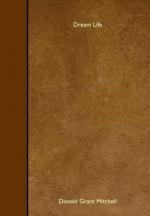You may learn its manner, and estimate its approaches; but when it comes, it comes always with the same awful front that it wore to your boyhood. Reason and Revelation may point to rich issues that unfold from its very darkness; yet all these are no more to your bodily sense, and no more to your enlightened hope, than those foreshadowings of peace which rest like a halo on the spirit of the child as he prays in guileless tones—OUR FATHER, WHO ART IN HEAVEN!
It is a holy and a placid grief that comes over you,—not crushing, but bringing to life from the grave of boyhood all its better and nobler instincts. In their light your wild plans of youth look sadly misshapen and in the impulse of the hour you abandon them; holy resolutions beam again upon your soul like sunlight, your purposes seem bathed in goodness. There is an effervescence of the spirit that carries away all foul matter, and leaves you in a state of calm that seems kindred to the land and to the life whither the sainted mother has gone.
This calm brings a smile in the middle of tears, and an inward looking and leaning toward that Eternal Power which governs and guides us;—with that smile and that leaning, sleep comes like an angelic minister, and fondles your wearied frame and thought into that repose which is the mirror of the Destroyer.
——Poor Clarence, he is like the rest of the world,—whose goodness lies chiefly in the occasional throbs of a better nature, which soon subside, and leave them upon the old level of desire.
As you lie between waking and sleeping, you have a fancy of a sound at your door;—it seems to open softly, and the tall figure of your father, wrapped in his dressing-gown, stands over you, and gazes—as he gazed at you before;—his look is very mournful; and he murmurs your mother’s name—and sighs—and looks again—and passes out.
At morning you cannot tell if it was real or a dream. Those higher resolves too, which grief and the night made, seem very vague and shadowy. Life with its ambitious and cankerous desires wakes again. You do not feel them at first; the subjugation of holy thoughts and of reaches toward the Infinite, leave their traces on you, and perhaps bewilder you into a half-consciousness of strength. But at the first touch of the grosser elements about you,—on your very first entrance upon those duties which quicken pride or shame, and which are pointing at you from every quarter,—your holy calm, your high-born purpose, your spiritual cleavings, pass away, like the electricity of August storms drawn down by the thousand glittering turrets of a city!
The world is stronger than the night; and the bindings of sense are tenfold stronger than the most exquisite delirium of soul. This makes you feel, or will one day make you feel, that life,—strong life and sound life,—that life which lends approaches to the Infinite, and takes hold on Heaven, is not so much a PROGRESS as it is a RESISTANCE!




